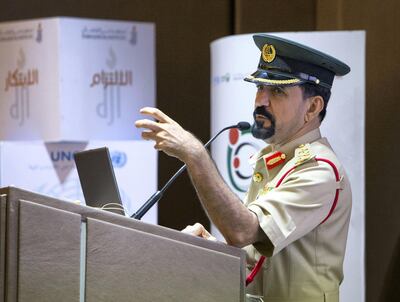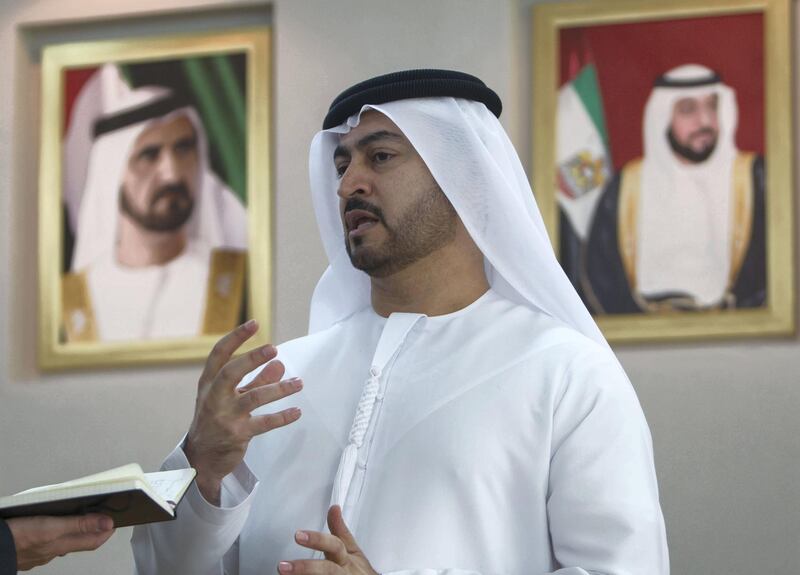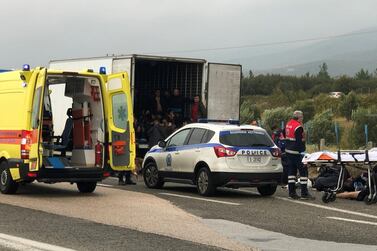A government-backed training programme equipping future crime fighters with the skills to crack open human trafficking rings operating in the UAE has been expanded across the Middle East.
The latest group of 38 students enrolled in the programme at the Dubai Judicial Institute will include representatives from Saudi Arabia and Bahrain.
The National Committee to Combat Human Trafficking and Dubai Police work in tandem to teach the latest methods in detecting human trafficking.
Graduates will then work with police and the judiciary system to rehabilitate victims and bring the culprits to justice.
Snakehead is a term used to describe a criminal specialising in people smuggling and human trafficking.
Since 2015, 120 graduates have come through the programme in Dubai to join the country's war against trafficking.
The tragic consequences of trafficking were highlighted last month when 39 Vietnamese people – including ten teenagers – were found dead in the back of a refrigerated lorry in the UK.
The driver, Maurice Robinson, 25, was charged with 39 counts of manslaughter, conspiracy to traffic people, conspiracy to assist unlawful immigration and money laundering.
Eight suspects were arrested in Vietnam last week in relation to people-smuggling offences.
"Human trafficking is a transnational crime with an international aspect, so there is a range of skills required to combat this crime," said Dr Jamal Al Sumaiti, director general of the Dubai Judicial Institute, during a human trafficking conference held in Dubai on Sunday.
“The law of human trafficking is covered in the course, but it is not an easy thing to understand as we are dealing with human beings.
“Students learn the skills of investigation, how to report these kind of crimes and how to deal with a victim.”
Although the course is open to all government employees of any nationality, they must pass an entry test to qualify.
Crucially, students are taught how to gather evidence that police can then use to prosecute criminal gangs.
Dr Al Sumaiti said the public could also play a vital role in reporting suspicious activity to police.
“We are teaching how to progress these cases towards an effective prosecution at court level and what is required to achieve that,” he said.
"We cannot combat this crime just with the police, it is a combined effort from all of us. Whenever people are concerned about a suspicious situation, especially at night, they need to know how to deal with this and how it can be reported."

According to the United Nations Office on Drugs and Crime, 63,251 human trafficking victims were identified in 106 countries and territories between 2012 and 2014.
An example of the extent of the problem is the variety in nationalities of victims, with 152 different nationalities identified across 124 countries.
The most recent report revealed more than 500 trafficking routes around the world, with 28 per cent of identified victims being children.
Statistics show 63 per cent of convicted traffickers are men but the number of female offenders is increasing.
The Middle East has relatively limited intra-regional and domestic trafficking as opposed to other parts of the world, the UN said, with 65 per cent of victims coming from outside the region.
Progress is being made though, said Boris Znamenski, regional programme officer for the United Nations Office on Drugs and Crime.
Mr Znamenski said wider understanding of the problem was vital.
“The UAE continues to play a leading role in its exceptional commitment to combat human trafficking in the Arab world,” he said.
"Since 2015, the diploma has provided crucial training in this area and we hope it continues to do so. Now [that] it has been expanded to other GCC countries, it has taken another important step to fighting this problem in the region."
Emirates airline is delivering a similar message to its staff, and has given more than 50,000 crew and ground staff training in how to spot vulnerable people being trafficked.
The company’s mandatory education programmes for airport staff, cabin crew and pilots have prevented scores of people from disappearing into criminal networks against their will, the airline said.
A team of 210 personnel in the Emirates Airport Security Unit were trained to detect signs of human trafficking and look out for incidents of potential child exploitation.
“As a result of the knowledge gained through the training modules, our airport check-in staff and cabin crew have alerted the relevant authorities to several instances of suspicious behaviour around potential human trafficking,” an Emirates spokesman said.
“We will continue to further improve practices and adopt activities to prevent human trafficking.
“Emirates is committed to using our industry leadership and influence to play an important role in helping prevent these crimes.”








